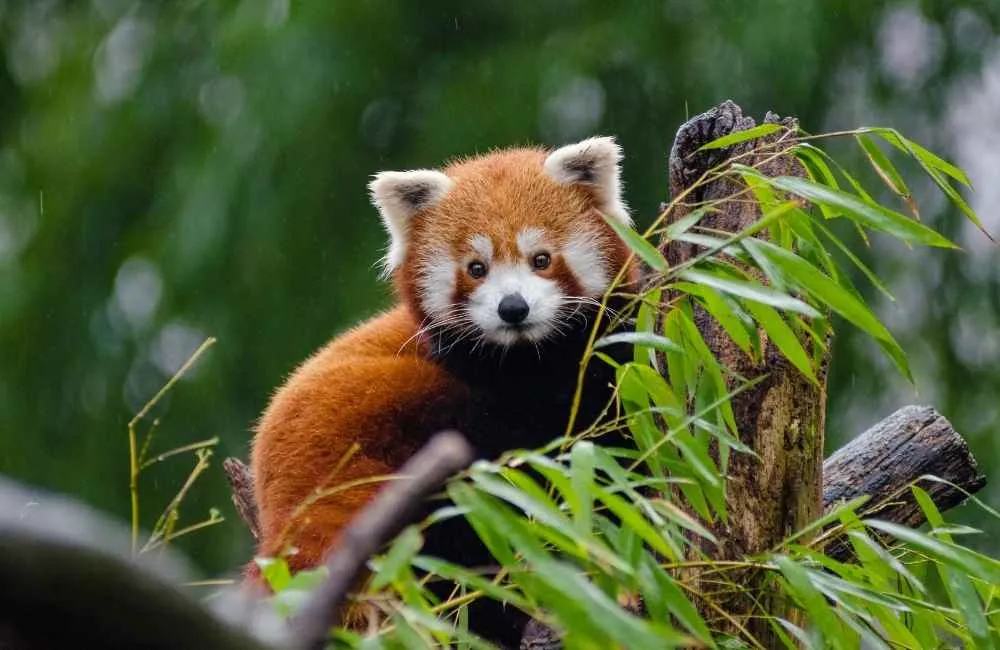You’ve seen the stories in the news just like I have. A four-foot long alligator found in a nearby creek, a bobcat kept on a leash, or a wolf going for walks in the local neighborhood are all stories you may have heard.
These are stories about ordinary people keeping wild animals as pets. Likewise, the local news often covers stories of people who tried to keep a wild animal as a pet and just couldn’t handle their needs. But is keeping a wild animal as a pet all bad?
In this article, we’re going to take a good hard look at the pros and cons of keeping wild animals as pets. We’ll tell you what’s good – and what’s not – when it comes to owning wild animals. So don’t be ashamed if you’ve ever dreamed of keeping a wild animal for your very own – just be sure to know when it’s a good idea and when it isn’t.
The Pros of Keeping Wild Animals As Pets
No one else has a pet like you.
If you like to stand out in a crowd, then having a wild animal as a pet is sure to do the trick. Most folks just don’t keep wild animals in their homes, so if you do, you’re extra special, for sure.
Your friends might be so excited by your special pet that they even prefer to visit your pet rather than just come to see you.
You get a new animal experience.
You may get to experience animals in ways that other people might not. It is one thing to sit in the woods and watch deer in their natural habitat, but it is quite another thing to keep deer as pets and get to interact with them up close and personal.
Check out this video of Dillie the Deer, a sweet pet deer. You might be surprised to find out just how loving a deer can be.
There are a lot more wild animals to choose from.
There are far more wild animals than there are typical domesticated animals that people keep as pets. You may find that wild animals are a lot more interesting and different than your standard cat, dog, hamster, or goldfish.
According to the National Wildlife Federation, there are 1.7 million identified species, and about 13,000 more are identified and added to the list each year. That’s a lot of potential pets!
Some wild animals are exceptionally friendly.
There are very friendly wild animals, like the capybara, a sort of oversized, water-loving guinea pig. These are legal to own in Texas and Pennsylvania, although they do require extra special care. But they are friendly and chill when it comes to interacting with humans.
And people are known to ‘tame’ squirrels and pigeons, too, which means these animals just aren’t afraid to be around their humans.
You can help replenish their population.
Some animals could use a little help with repopulation. In Pennsylvania, quail habitats have been destroyed, and quail have been overhunted.
The Pa Game Commission has created a plan to help repopulate quail. In some instances, you can raise quail to be released to increase the natural wild quail population.
Wild animals are beautiful.
Imagine keeping an exotic fish in a fish tank where you can see it every day! Or you can gaze upon a beautiful bird or a fascinating snake.
Wild animals often have colorings and markings that our domestic friends just don’t display and they are amazing to watch! Keeping one as a pet means you can see it all of the time and not just when you’re out in the wild.
Pest control.
How about using wild animals for pest control? Some areas are domesticating foxes, which can keep small rodents under control.
Or perhaps you want to have a pet frog to eat bugs. You might even be able to have a pet anteater to take care of the termite population, but we suspect a venus flytrap would be just as effective.
You can save animals.
Perhaps you didn’t set out to have a pet squirrel, but in many places, even if it isn’t legal to purchase a squirrel as a pet, it is ok to rehab one.
Rescuing baby birds and baby squirrels is sometimes legal, and it can be very rewarding when you set them free. Check out this overview of how to rehab a baby squirrel
.
The Cons of Keeping Wild Animals As Pets
It’s dangerous.
You may be putting yourself – or your family and friends – in physical danger. Let’s face it, even if you CAN keep a tiger as a pet that doesn’t mean you should.
Some wild animals, like tigers, are simply too dangerous to have around. Even with the best cages, accidents happen and your tiger could still get loose.
And no matter how much you’ve trained it, you never know when it could lash out. With the powerful jaws and massive teeth and claws, you are physically no match for an angry tiger. So while it might seem cool to have a giant striped pet, you’ll be risking your life and the lives of your loved ones if you keep a wild animal, such as a big cat, as a pet.
Your new pet might eat your old one.
If you try welcoming a gator, snake, or some other wild predator into your home, you may be putting your domesticated pets at risk of being eaten or even swallowed whole! A boa or a python might seem like a fun idea until it sees your Bichon Frise as his next snack.
You could get sick.
Wild animals carry different diseases than domesticated animals can. You could catch anything from Rocky Mountain Spotted Fever to the Bubonic Plague, rabies, and even distemper. If you have a weakened immune system, the risks are even greater.
You have to hide your pet.
If your friends and family don’t think you should be keeping a wild animal as a pet, they might quietly let animal control or the police know about your contraband. So you’ll end up hiding your precious pet from the police, your landlord, or even friends and family that may tattle on you.
You could endanger the species.
According to aza.com, the pet parrot trade has put such pressure on wild flocks that it is hurting their chances of survival. Illegal capturing of parrots – and other wild animals- means they can’t survive and reproduce in the wild, and they may become extinct.
It’s just plain cruel.
Sometimes, you think you’re doing a good thing by buying a wild animal as a pet, but it’s actually cruel. Perhaps the animal hasn’t been treated well, it’s hurt or suffering, or it just isn’t going to be happy when kept in a home.
Some animals need to roam or be with their own kind to be happy, and keeping it as a pet just isn’t good enough. Some animals are just better off in the wild, no matter what we think. Read more from World Animal Protection.
You’re breaking the law.
It is illegal to own a lot of wild animals, and if you get caught, you could be fined or, worse, go to jail. Is keeping a wild animal really worth jail time?
What will happen to your pet when you are put away? How will you care for your family if you go to jail for owning a wild pet?
Wild animals can be hard to rehome.
Think about this – if something should happen that you can no longer care for your wild-at-heart pet, who will take care of it? How will you rehome an exotic animal or a wild animal? They are much harder to care for and, therefore, much harder to rehome.
They stink!
Some people think that skunks make great pets if you can get past the smell! Of course, you can have their scent glands removed, but then you’re subjecting an animal to painful, unnecessary surgery.
It is legal to have a skunk as a pet in some areas, but why would you want to? Find out more about keeping skunks as pets, here.
Keep in mind that many wild animals have very distinct odors that might not be welcome in your home.
You don’t have the room for a wild animal.
Ok, you might be able to fit a wild frog in your aquarium, but you certainly don’t have room for an elephant. How would a giraffe curl up next to you on a comfy couch?
Where will the hippopotamus get his bath? The kitchen sink? All joking aside, many wild animals are just too large to take up residence where you live.
They can also get upset if their enclosure is too small, as is the case with raccoons.
You need to invest in extra special cages and pens.
Some wild animals have special cage requirements. For example, pet wallabies may be becoming more popular in new Zealand, but they need very large backyards with extremely secure fencing to keep them safe and at home. Other animals may need large aquariums, heavy fencing, or expensive cages to keep them – and you -safe.
You need to learn a lot about animal care.
Wild animals have different routines, extra needs, and special diets. You’ll need to learn how to interact with them safely, provide for their specific nutritional needs, and give them a comfortable living space.
It’s a lot of work and a big commitment to keep a wild animal as a pet.
And if that isn’t something you’re into, you might just wanna stick to a hermit crab.
One word, venom.
Some wild animals are dangerous because of their venom. Snakes, spiders, stonefish, slow loris, jellyfish, gila monsters, shrews, and even the adorable duck-billed platypus can all give you a nasty dose of venom if they bite or sting you, according to Discover Wildlife. You’re probably best to leave the venomous animals and the scorpions in the wild, where they belong.
Wild animals are expensive.
A tiger cub could easily cost you $2500, and a wolf-dog puppy can cost up to $3000.
A baby skunk can easily set you back up to $500, and a fox can cost anywhere from $500 to $6000 dollars! Just paying for one of these animals isn’t cheap, and some need to be kept in packs. These kinds of prices sure make stray cat adoption fees very attractive!
You may not be able to find vet care.
When I had a pet hedgehog, I had a terrible time finding a vet that could care for his health needs. But keeping a wild animal as a pet can be even harder.
You need to make sure you have a vet that can treat that specific animal, whether it’s a skunk, a squirrel, a tarantula, or something altogether harder.
They can outlive you.
Cats and dogs have a relatively short lifespan, but wild animals like tortoises, flamingos, and parrots can easily outlive humans.
If you do have a pet giant tortoise, who will take care of it when you die? Check out these animals that can easily outlive humans.
Lastly, they’re wild!
You may not want to keep a wild animal as a pet for the simple reason that it is wild. Wild animals aren’t domesticated, so you may not be able to housetrain them, teach them to be quiet, or to behave when you need them to.
Wild animals can be stubborn and unpredictable, difficult to manage, and hard to care for. They aren’t easy to have around because they’re just too wild.
Let wild animals be where they were born to be. In nature!


